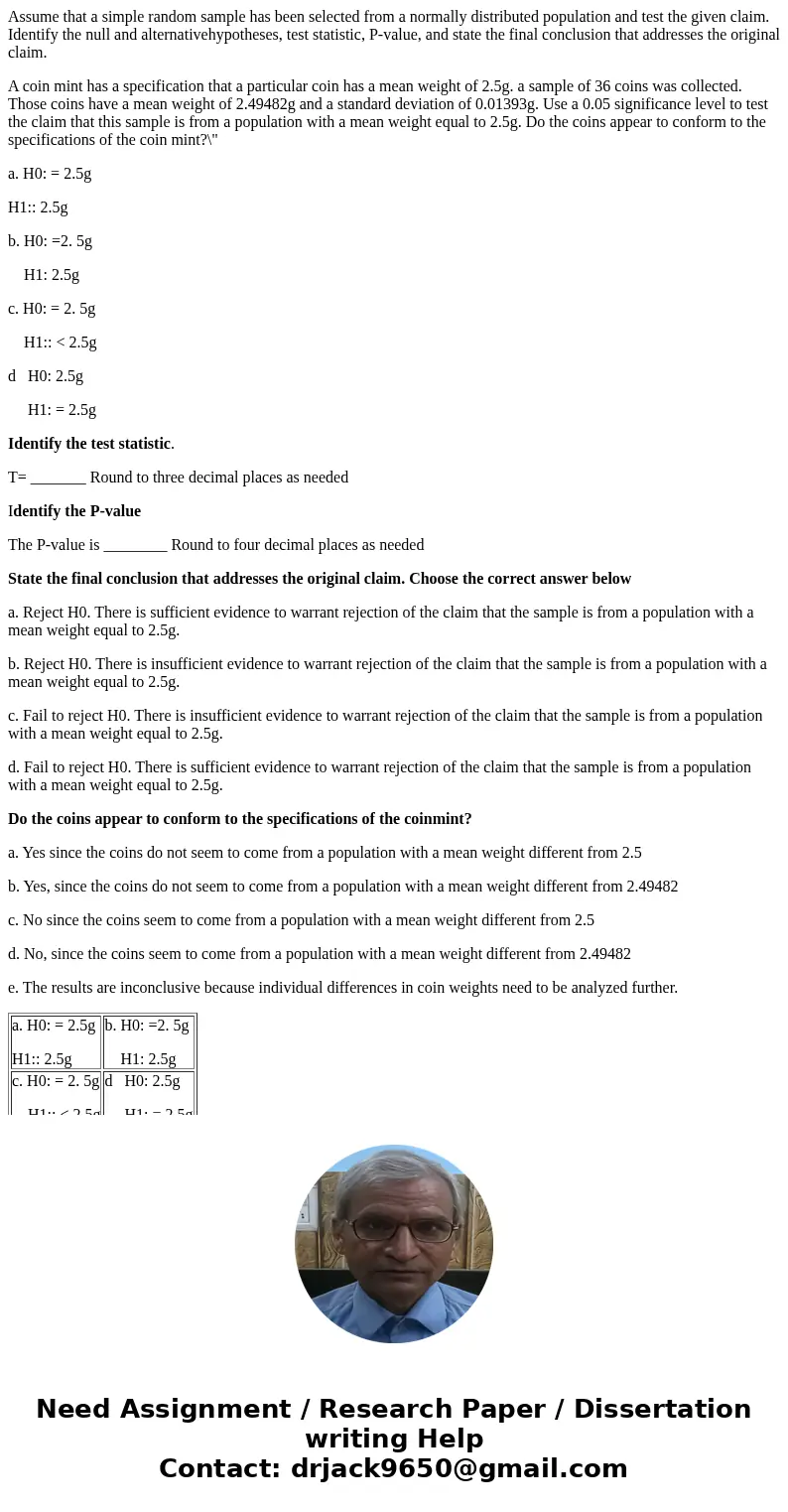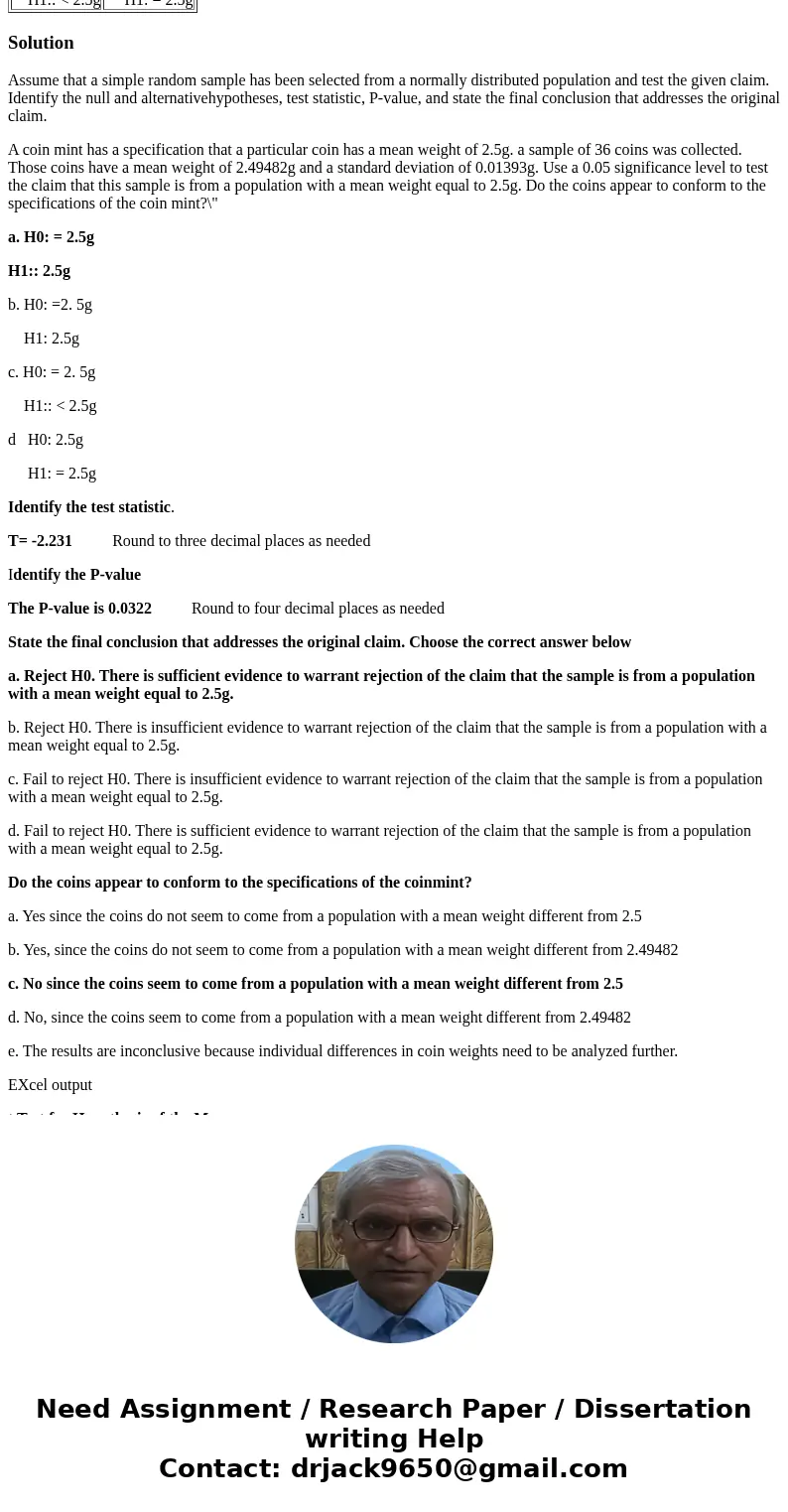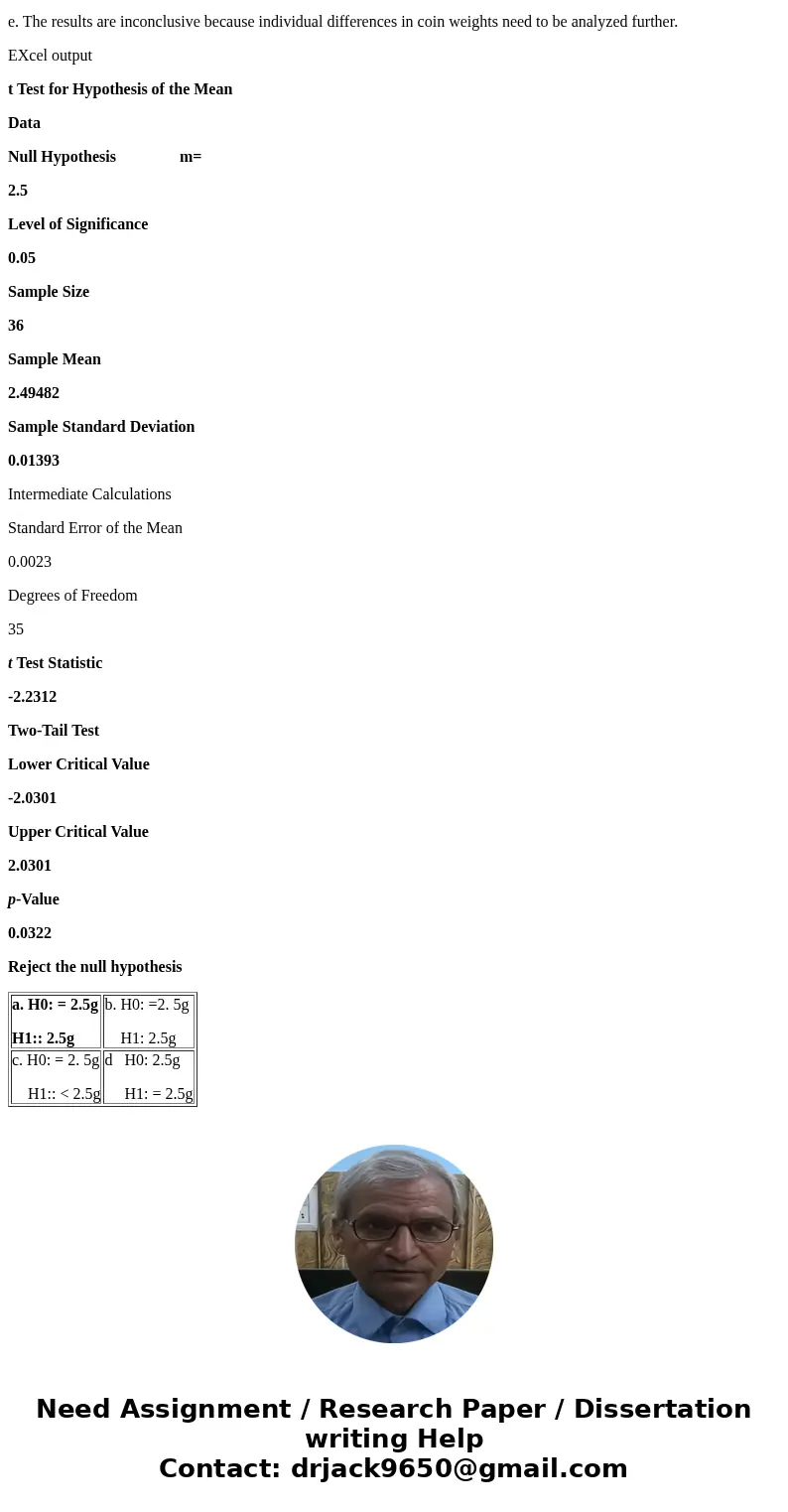Assume that a simple random sample has been selected from a
Assume that a simple random sample has been selected from a normally distributed population and test the given claim. Identify the null and alternativehypotheses, test statistic, P-value, and state the final conclusion that addresses the original claim.
A coin mint has a specification that a particular coin has a mean weight of 2.5g. a sample of 36 coins was collected. Those coins have a mean weight of 2.49482g and a standard deviation of 0.01393g. Use a 0.05 significance level to test the claim that this sample is from a population with a mean weight equal to 2.5g. Do the coins appear to conform to the specifications of the coin mint?\"
a. H0: = 2.5g
H1:: 2.5g
b. H0: =2. 5g
H1: 2.5g
c. H0: = 2. 5g
H1:: < 2.5g
d H0: 2.5g
H1: = 2.5g
Identify the test statistic.
T= _______ Round to three decimal places as needed
Identify the P-value
The P-value is ________ Round to four decimal places as needed
State the final conclusion that addresses the original claim. Choose the correct answer below
a. Reject H0. There is sufficient evidence to warrant rejection of the claim that the sample is from a population with a mean weight equal to 2.5g.
b. Reject H0. There is insufficient evidence to warrant rejection of the claim that the sample is from a population with a mean weight equal to 2.5g.
c. Fail to reject H0. There is insufficient evidence to warrant rejection of the claim that the sample is from a population with a mean weight equal to 2.5g.
d. Fail to reject H0. There is sufficient evidence to warrant rejection of the claim that the sample is from a population with a mean weight equal to 2.5g.
Do the coins appear to conform to the specifications of the coinmint?
a. Yes since the coins do not seem to come from a population with a mean weight different from 2.5
b. Yes, since the coins do not seem to come from a population with a mean weight different from 2.49482
c. No since the coins seem to come from a population with a mean weight different from 2.5
d. No, since the coins seem to come from a population with a mean weight different from 2.49482
e. The results are inconclusive because individual differences in coin weights need to be analyzed further.
| a. H0: = 2.5g H1:: 2.5g | b. H0: =2. 5g H1: 2.5g |
| c. H0: = 2. 5g H1:: < 2.5g | d H0: 2.5g H1: = 2.5g |
Solution
Assume that a simple random sample has been selected from a normally distributed population and test the given claim. Identify the null and alternativehypotheses, test statistic, P-value, and state the final conclusion that addresses the original claim.
A coin mint has a specification that a particular coin has a mean weight of 2.5g. a sample of 36 coins was collected. Those coins have a mean weight of 2.49482g and a standard deviation of 0.01393g. Use a 0.05 significance level to test the claim that this sample is from a population with a mean weight equal to 2.5g. Do the coins appear to conform to the specifications of the coin mint?\"
a. H0: = 2.5g
H1:: 2.5g
b. H0: =2. 5g
H1: 2.5g
c. H0: = 2. 5g
H1:: < 2.5g
d H0: 2.5g
H1: = 2.5g
Identify the test statistic.
T= -2.231 Round to three decimal places as needed
Identify the P-value
The P-value is 0.0322 Round to four decimal places as needed
State the final conclusion that addresses the original claim. Choose the correct answer below
a. Reject H0. There is sufficient evidence to warrant rejection of the claim that the sample is from a population with a mean weight equal to 2.5g.
b. Reject H0. There is insufficient evidence to warrant rejection of the claim that the sample is from a population with a mean weight equal to 2.5g.
c. Fail to reject H0. There is insufficient evidence to warrant rejection of the claim that the sample is from a population with a mean weight equal to 2.5g.
d. Fail to reject H0. There is sufficient evidence to warrant rejection of the claim that the sample is from a population with a mean weight equal to 2.5g.
Do the coins appear to conform to the specifications of the coinmint?
a. Yes since the coins do not seem to come from a population with a mean weight different from 2.5
b. Yes, since the coins do not seem to come from a population with a mean weight different from 2.49482
c. No since the coins seem to come from a population with a mean weight different from 2.5
d. No, since the coins seem to come from a population with a mean weight different from 2.49482
e. The results are inconclusive because individual differences in coin weights need to be analyzed further.
EXcel output
t Test for Hypothesis of the Mean
Data
Null Hypothesis m=
2.5
Level of Significance
0.05
Sample Size
36
Sample Mean
2.49482
Sample Standard Deviation
0.01393
Intermediate Calculations
Standard Error of the Mean
0.0023
Degrees of Freedom
35
t Test Statistic
-2.2312
Two-Tail Test
Lower Critical Value
-2.0301
Upper Critical Value
2.0301
p-Value
0.0322
Reject the null hypothesis
| a. H0: = 2.5g H1:: 2.5g | b. H0: =2. 5g H1: 2.5g |
| c. H0: = 2. 5g H1:: < 2.5g | d H0: 2.5g H1: = 2.5g |



 Homework Sourse
Homework Sourse